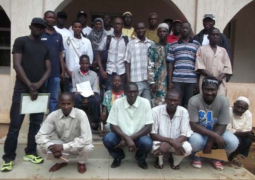A
diabetes prevention campaign through sport is set for Sunday at the
Independence Stadium.
The
campaign was organised by the Youth Empowerment through Education and Sports
(YETES) to encourage people, especially the youths, to exercise regularly,
which goes a long way in preventing diabetes and suppressing it from doing any
serious harm to its victims.
In
this case, sport is being used to enlighten the youths on identifying and preventing
diabetes through physical exercise.
“We
are not just educating; we are saving lives,” the CEO of YETES said.
It
is very important that we as nation take this call on sport to prevent diabetes
seriously, as the disease has been causing serious harm to human beings.
A
deadly disease, diabetes affects 371 million people worldwide, and it is on
record that of this figure about 187 million people do not even know they have
diabetes.
The
Gambia, according to World Health Organization (WHO), is said to have a higher
percentage overall of raised blood glucose level, hence the country is not
immune to diabetes.
According
to recent WHO data, the Gambian population has a higher percentage overall of
raised blood glucose level compared to other sub-Saharan Africa countries.
“Clearly,
something needs to be done about diabetes in The Gambia”
A
WHO statement in April this year stated that diabetes is a disease
characterised by elevated blood glucose levels. Most diabetes is type 2
diabetes, largely caused by unhealthy eating and lack of physical activity.
Staggeringly,
today more than one in three adults are overweight, and more than one in 10 is
obese.
Type
1 diabetes, which most commonly affects children and adolescents and requires
daily insulin for survival, is currently not preventable.
At
the World Health Assembly in 2013, governments committed to halt the rise of
diabetes by 2025, but we are clearly not on track.
Policies
are needed to improve people’s access to affordable, healthy foods and to
opportunities for physical activity, to influence patterns of diet and physical
activity across whole populations.
A
combination of fiscal policies, legislation, changes to the environment and
raising awareness of health risks works best for promoting healthier diets and
physical activity.
Such
measures will also benefit people living with diabetes and reduce risk of
complications.
“Trying
to manage diabetes is hard because if you don’t, there are consequences you’ll
have to deal with later in life.”
Bryan
Adams





